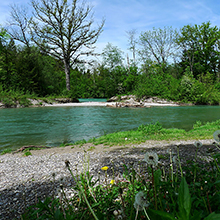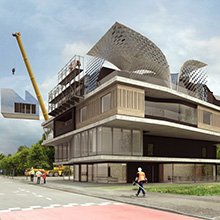Energy research at Eawag
Within the framework of the ETH Domain’s strategic area of focus «Energy», Eawag investigates the environmental impacts of energy production, the acceptance of alternative energy supply, the potential for energy savings and energy production from wastewater.
Impacts of energy production on water bodies
The use of our water bodies for hydropower or for heating and cooling influences a river’s bed load and sediment regime as well as its aquatic organisms. Eawag researchers study the environmental impacts of energy production and are actively engaged in consulting, for example concerning nuclear energy or methane extraction from lakes.
Hydropower
More projects involving Eawag researchers
Wasser-Agenda 21 (website in German and French)
Dialogue platform of the Swiss water management dealing, among other things, with hydropower use and hydro-peaking.
African Dams Project (ADAPT) completed
Integrated water resource management in the multiply dammed Zambezi basin
Green Hydropower (report in German) completed
Interdisciplinary Eawag project in which an eco-label for sustainable electricity production from hydropower has been developed
Sustainable floodplain management and hydropower (NFP 70)
Actions to ensure a gentle downstream fish passage at hydropower plants completed
Modelling of habitat dynamics in river sections subject to surges completed
Heating and cooling
Methane
Social impacts of the energy transition
Environmental social sciences mainly address the social impacts of the energy transition such as the acceptance of hydropower or of alternative energy supply.
Saving and producing energy
Nutrient recovery, e.g. nitrogen and phosphorus from urine, saves a lot of energy because less artificial fertiliser has to be synthesised by an energy-intensive process. Not only nutrients can be recovered from wastewater, but also heat and other forms of energy. Therefore, future wastewater treatment plants may act as power plants.
Nutrient recovery
More projects involving Eawag researchers
Blue Diversion
Production of fertilizer out of digester supernatant and urine
Struvite from Urine in Nepal completed
Energy production and saving
Further projects involving Eawag researchers
POWERSTEP: energy production in wastewater treatment plants
















